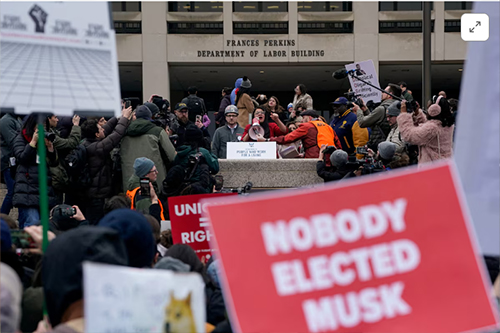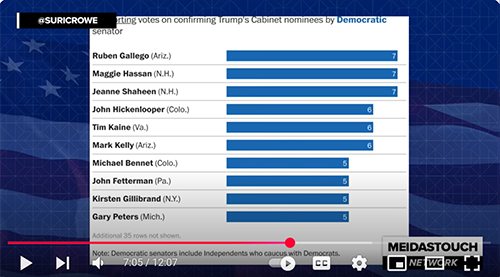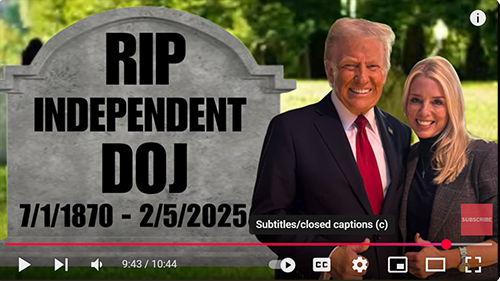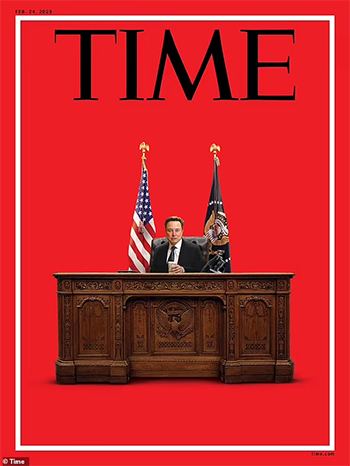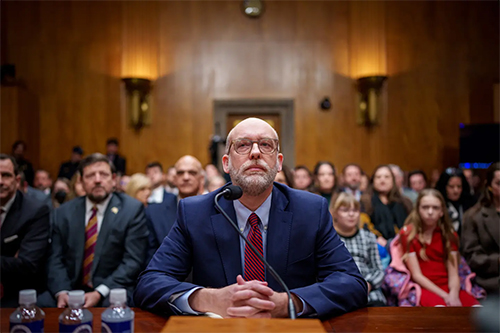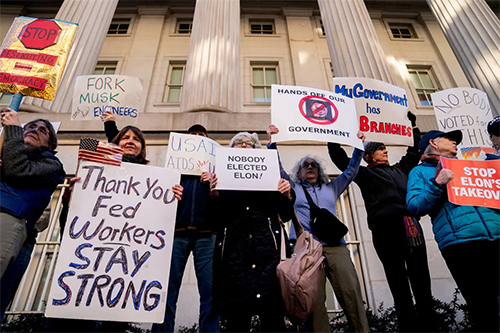FOR THE DISTRICT OF COLUMBIA
JOHN AND JANE DOES 1-9 Employees/Agents of the Federal Bureau of Investigations, on behalf of themselves and those similarly situated,
Plaintiffs,
v.
DEPARTMENT OF JUSTICE; James McHenry, Acting Attorney General of the United States,
Defendant.
Case 1:25-cv-00325
CLASS ACTION COMPLAINT
JURY TRIAL DEMANDED
CLASS ACTION COMPLAINT
Comes now Plaintiffs, John and Jane Does 1-9 (hereinafter “Plaintiffs”) on behalf of themselves and all similarly situated current and former agents and/or employees of the Federal Bureau of Investigations (hereinafter “FBI”), by and through undersigned counsel, with their Class Action Complaint for Injunctive Relief, and state as follows:
INTRODUCTION
Plaintiffs are currently employed agents and/or employees of the FBI, who, during the course of their duties worked on, or participated in the investigation of persons suspected of criminal activity related to the January 6, 2021, attack on the United States Capitol building ( “the Jan. 6 attack” or “Jan. 6 cases”) at the behest of Donald Trump, and/or the unlawful removal, retention and storage of classified documents by Mr. Trump (hereinafter “Mar-a-Lago case”). Upon returning to the Presidency, Mr. Trump has ordered the DOJ to conduct a review and purge of FBI personnel involved in these investigations and prosecutions. This directive is unlawful and retaliatory, and violates the Civil Service Reform Act 5 U.S.C. §§2301 and 2303.
Additionally, on or about February 2, 2025, Plaintiffs were instructed to fill out a survey that would identify their specific role in the Jan. 6 and Mar-a-Lago cases. Some Plaintiffs were required to fill out the survey themselves, others were told that their supervisors would be filling out the form. Plaintiffs were informed that the aggregated information is going to be forwarded to upper management. Plaintiffs assert that the purpose for this list is to identify agents to be terminated or to suffer other adverse employment action. Plaintiffs reasonably fear that all or parts of this list might be published by allies of President Trump, thus placing themselves and their families in immediate danger of retribution by the now pardoned and at-large Jan. 6 convicted felons. Defendant’s gathering, retention, and disclosure of Plaintiffs’ activities related the acts of former President Trump is a violation of Plaintiffs’ rights under the First Amendments to the Constitution. It is also a violation of Plaintiffs’ Fifth Amendment substantive and due process rights, such that the Court has the authority to enjoin the serious harm it is likely to cause. Moreover, the publication or dissemination of the information in these surveys would be a violation of the Privacy Act of 1974, 5 U.S.C. §552a, and would place Plaintiffs in immediate risk of serious harm. Accordingly, Plaintiffs seek to enjoin the publication or dissemination of these surveys, or any information derived therefrom.
THE PARTIES
1. Plaintiffs are employees of the FBI who worked on Jan. 6 and/or Mar-a-Lago cases, and who have been informed that they are likely to be terminated in the very near future (the week of February 3-9, 2025) for such activity. They intend to represent a class of at least 6,000 current and former FBI agents and employees who participated in some manner in the investigation and prosecution of crimes and abuses of power by Donald Trump, or by those acting at his behest.
2. Defendant is the current Acting Attorney General of the United States, and the person authorized and tasked with enacting the political will of President Trump.
3. The Federal Bureau of Investigations is an agency under the control of the Department of Justice, with its headquarters located at 935 Pennsylvania Avenue NW, Washington, DC 20535. All essential personnel decisions and employment records are housed at the FBI headquarters.
JURISDICTION
4. Pursuant to 28 U.S.C. § 1331, this Court enjoys jurisdiction over this matter because Plaintiffs assert claims under the laws of the United States. This Court also has jurisdiction over this matter because the Defendant is an agency of the United States. See 28 U.S.C. § 1346.
5. Defendant waived sovereign immunity because the Privacy Act allows for damages against the United States.
6. Sovereign immunity for declaratory relief is waived by 5 U.S.C.§ 702, and by the fact that Plaintiffs assert claims pursuant to the Constitution of the United States.
7. Plaintiffs are not seeking any universally applicable are national remedy or injunction. Rather they seek injunctive relief only for themselves and the members of the putative Class that are parties before this Court.
FACTS APPLICABLE TO ALL PLAINTIFFS
8. The FBI investigates a variety of crimes, including terrorism, cybercrime, white collar crimes, and public corruption.
9. The FBI collects, analyzes, and shares intelligence to understand and combat security threats.
10. Additionally, the FBI provides services like fingerprint identification, laboratory examinations, and training.
11. The FBI protects the United States from foreign intelligence, espionage, and cyber operations, and combats cyber-based attacks and high-technology crimes.
12. The FBI is part of the Department of Justice, and reports its investigations to the attorney general and United States attorneys' offices. It is impossible to overstate the importance of the FBI’s work to the security of the United States.
13. FBI agents are chosen through a highly selective process, and are carefully screened for aptitude and trustworthiness.
14. FBI agents go through more than four months of intensive training at the FBI academy before beginning their duties, and attend numerous training sessions throughout their careers to adapt to new technologies and emerging threats.
15. Many FBI agents are multi-lingual and routinely interface with intelligence agencies from allied nations.
16. The training FBI agents receive is comprehensive, and in some instances, extremely expensive.
17. On information and belief, Plaintiffs assert that each agent of the FBI receives more than 3 million dollars-worth of training in a twenty (20) year career.
18. FBI agents also develop specific expertise from their assignments and field duties, much of which cannot be replicated solely by training.
19. FBI agents often face threats to their personal safety, at times going under cover and/or working in extremely dangerous areas to obtain information necessary to secure the interests of the United States.
20. FBI agents are tasked by their chain and command and leadership team, and are not free to refuse assignments based on their political or personal preferences.
21. Plaintiffs’ tasks routinely involved, inter alia, reviewing video evidence, interviewing witnesses, executing search and arrest warrants, interfacing with confidential informants, reviewing and analyzing cyber communications, investigating financial transactions and other activities for the purpose of identifying persons engaged in unlawful conduct, and assisting in the prosecution of said persons, and/or providing support for such activities.
22. On or about January 6, 2021, a protest led by Donald Trump took place at the ellipse in front of the United States Capitol building, which erupted into violence.
23. Hundreds of rioters (“Jan. 6 Rioters”) forcefully breached the Capitol building, ignoring the directions of both Capitol Police and Police Officers of the Washington DC Metropolitan Police Department ( “MPD”).
24. Rioters violently attacked law enforcement officers causing one fatality and hundreds of injuries. To date, five (5) police officers have died as a result of what transpired during the Jan. 6 attack.
25. Additionally, Jan 6 Rioters vandalized the halls of Congress, unlawfully entered into secured areas of the Capitol building, and threatened the lives of members of Congress and the Vice President of the United States.
26. Over the four years that followed the Jan. 6 attack, Plaintiffs worked diligently to bring to justice the persons who had engaged in illegal activity related to the incitement, planning, preparation and execution of the Jan. 6 attack, resulting in the successful prosecution of more than 1,500 people.
27. A recurring theme in the trials of the Jan. 6 Defendants is that they appeared at the Capitol, and engaged in violent action at the urging and direct request of Donald Trump.
28. It is also undisputed that while Donald Trump was keenly aware of the violence taking place at the Capitol on that day, for hours he did nothing to intercede or persuade the Jan. 6 Rioters to cease their activity.
29. Information obtained during the investigation of the Jan. 6 attack also established that Mr. Trump was an active participant in the planning of the attack on the Capitol, and of the coordinated effort by some members of Congress to evade certification of the election results.
30. Plaintiffs assert that the ultimate goal of both the Jan. 6 attack and the efforts in Congress by allies of Donald Trump was to block the peaceful transition of power to the winner of the 2020 Presidential Election, Joe Biden.
31. As a result of the work of Plaintiffs and other members of the putative Class, Special Counsel Jack Smith ( “SC Smith”) achieved a Grand Jury indictment of Donald Trump which was in the process of being litigated when the 2024 Presidential Election took place.
32. Also, as a result of the work of Plaintiffs and the putative Class, SC Smith was able to secure a Grand Jury indictment of Mr. Trump for the unlawful removal, retention and storage of classified documents at Mar-a-Lago.
33. During his campaign for office, Mr. Trump repeatedly stated that he would personify “the vengeance” or “the retribution,” for those whom he called “political hostages,” for their actions during the Jan. 6 attack.
34. On or about November 9, 2024, Donald Trump was reelected President. On or about January 20, 2024, Mr. Trump was inaugurated.
35. Shortly after his inauguration, DOJ terminated all of the attorneys who prosecuted Jan. 6 cases.
36. These terminations were directed by Mr. Trump. They were politically motivated and unlawful, and were precisely the kind of retribution promised by Mr. Trump.
37. On or about February 1, 2025, Plaintiffs learned that a similar purge of personnel was being contemplated for the FBI.
38. On or about February 2, 2025, during a teleconference with many agents and several managers, some of the Plaintiffs were informed that they would be required to fill out a survey about their activities related to the Jan. 6 cases. See EXHIBIT 1.
39. As can be seen in EXHIBIT 1, the information supplied would be retrievable by the employees name and email address, or by other identifying information such as an employee number.
40. During this teleconference, Plaintiffs were informed that the order to fill out the survey was a lawful order according to the DOJ Office of General Counsel.
41. Plaintiffs assert that the specific purpose of this survey is to identify agents and other FBI personnel to be terminated as a form of politically motivated retribution.
42. Moreover, Plaintiffs have been informed that some of their personal information has already been posted by Jan. 6 convicted felons on “dark websites” (aka the “dark web”), and are particularly concerned about further publication of their personal information.
43. Plaintiffs assert that the very act of compiling lists of persons who worked on matters that upset Donald Trump is retaliatory in nature, intended to intimidate FBI agents and other personnel, and to discourage them from reporting any future malfeasance and by Donald Trump and his agents.
44. It has been widely reported that Elon Musk and persons working with him have recently attempted to access government databases that house personal information, without regard to security protocols, and without a legitimate business purpose.
45. Plaintiffs legitimately fear that the information being compiled will be accessed by persons who are not authorized to have access to it, and who lack the requisite security clearances to handle such information.
46. Plaintiffs further assert that even if they are not targeted for termination, they may face other retaliatory acts such as demotion, denial of job opportunities or denial of promotions in the future.
CLASS ACTION ALLEGATIONS
47. Plaintiffs bring this action on behalf of:
All FBI personnel for whom a survey was requested and/or completed by the Trump administration that identifies their specific role in the Jan. 6 and Mar-a-Lago cases.
48. Class certification is appropriate under Fed. R. Civ. P. 23(a), (b)(1) and (b)(2), and alternatively, (b)(3).
49. The Class satisfies the numerosity requirement because it is composed of at least 6,000 current and former FBI agents and employees. The number of class members is so large that joinder of all its members is impracticable.
50. Common questions of law and fact include:
A. Whether the survey requested by Defendant is collecting information to determine which FBI agents and other personnel worked on the Jan. 6 and Mar-a-Lago cases;
B. Whether the survey requested by Defendant is collecting information to catalogue FBI agents and other personnel for eventual termination;
C. Whether the survey requested by Defendant is collecting information to catalogue FBI agents for eventual other adverse employment actions;
D. Whether it is lawful for Defendant to collect the names, specific roles and other information requested in the survey for purposes of termination or other adverse employment actions.
E. Whether Defendant’s motivation in gather information about Plaintiffs’ activities is to target them for discrimination based on their real or perceived political affiliation.
F. Whether the collection of the survey’s information will result in Plaintiffs and the Class suffering irreparable harm.
G. Whether publication or dissemination of information gathered by the survey would cause Plaintiffs irreparable harm.
H. Whether the information gathered by the survey and stored by the FBI constitutes a “system of records” as Defined by the Privacy Act.
I. Whether all Plaintiffs have First and Fifth Amendment rights that would be violated if Defendant were to disclose the information gathered by the survey.
J. Whether all Plaintiffs’ First and Fifth Amendment rights would be violated should Defendant use the information gathered to retaliate against Plaintiffs.
51. Plaintiffs are typical of the claims of the Class because they are subject to the same decision and motivation, derived directly from the AG, and will all be made whole by the injunctive relief requested in this Class Complaint. Further, they have no interests that are antagonistic to the claims of the Class. They understand that this matter cannot be settled without the Court’s approval.
52. Plaintiffs will fairly and adequately protect the interests of the Class. Plaintiffs are committed to the vigorous representation of the Class. Plaintiffs have hired adequate counsel in the Center for Employment Justice, whose lawyers collectively have decades of experience in litigating complex class actions.
53. Plaintiffs’ counsel have agreed to advance the cost of the litigation contingent on the outcome of this case, and understand that no fee will be awarded without the Court’s approval.
54. A class action is the superior method for the fair and efficient adjudication of this controversy. Joinder of all members of the class is impracticable, as the Plaintiff are located all over the country, and would require substantial and costly duplication of effort. Individual proceedings, therefore, would pose the risk of inconsistent adjudications. Plaintiffs are unaware of any difficulty in the management of this action as a class action.
55. This Class may be certified under Rule 23(b).
A. 23(b)(1). Prosecution of separate actions by individual members would create the risk of (A) inconsistent or varying adjudications with respect to individual class members that would establish incompatible standards of conduct for the Defendants, or (B) adjudications with respect to individual class members would, as a practical matter, be dispositive of the interests of the other members not parties to the adjudication or substantially impair or impede their ability to protect their interests;
B. 23(b)(2). The party opposing the Class has acted on grounds that apply generally to the class, so that final injunctive relief or corresponding declaratory relief is appropriate respecting the Class as a whole; or in the alternative
C. 23(b)(3). This action is suitable to proceed as a class action under 23(b)(3) because questions of law and fact common to the members of the Class predominate over individual questions, and a class action is superior to other available methods for the fair and efficient adjudication of this controversy. Given the nature of the allegations, no class member has an interest in individually controlling the prosecution of this matter.
CLAIMS FOR RELIEF
COUNT I
(Violation of the First Amendment to the Constitution—Retaliation Based on Perceived Political Affiliation)
56. Plaintiffs incorporate all of the allegations in the previous paragraphs as if fully restated herein.
57. Government employees are protected by the First Amendment from discrimination or retaliation based on their political beliefs or affiliation, or the perception thereof.
58. On or about February 2, 2025, Plaintiffs were asked to self-report their activities on the Jan. 6 and Mar-a-Lago cases, or were told their managers would be providing such information to Trump administration officials.
59. Plaintiffs were informed that the aggregated list of all Jan. 6 and Mar-a-Lago FBI agents and other personnel is going to be forwarded to senior members in Donald Trump’s administration.
60. On or about January 31, 2025, DOJ summarily terminated all of the attorneys who prosecuted Jan. 6 and Mar-a-Lago cases precisely because of the Trump administration’s perception of those attorneys’ political loyalties.
61. Plaintiffs reasonably believe and fear that the information gathered in the survey will also be used to target them for retaliatory discharge due to the Trump administration’s perception of their loyalties.
62. Donald Trump has made repeated public pronouncements of his intent to exact revenge upon persons he perceives to be disloyal to him by simply executing their duties in investigating acts incited by him and persons loyal to him.
63. Whatever the Trump administration believes about Plaintiffs’ political affiliation, it clearly believes that persons who were involved in the investigation and prosecution of Jan. 6 and Mar-a-Lago cases are insufficiently politically affiliated with Donald Trump to be entitled to retain their employment.
64. Plaintiffs assert that there is no other legitimate agency purpose for this list to be created or to exist. The FBI has sufficient information in other forms to identify the work of FBI agents, and to either laud or discipline them for their work performance.
65. Plaintiffs assert that there is a real and material risk that the list itself, or parts thereof, will be shared with or leaked to persons or entities that harbor ill will towards the agents and other personnel involved in Jan. 6 and Mar-a-Lago cases.
66. Should this information fall into the wrong hands, Plaintiffs would be placed at immediate risk of serious personal harm and harm to their loved ones.
67. Should this information fall into the wrong hands, Plaintiffs would likely suffer measurable pecuniary damages such as loss of property, loss of income and damage to reputation.
68. Should this information fall into the wrong hands, the national security of the Unite States would be severely compromised.
69. Plaintiffs emphasize that they work or worked on a wide variety of threats to the United States, originating both domestically and from abroad, and that the list of persons who would wish harm upon them for the execution of their duties is vast.
70. Plaintiffs therefore respectfully seek immediate relief to enjoin the aggregation, storage, reporting, publication or dissemination of any list or compilation of information that would identify FBI agents and other personnel, and tie them directly to Jan. 6 and Mar-a-Lago case activities.
COUNT II
(Violation of the Fifth Amendment to the Constitution – Violation of Plaintiffs’ Substantive and Procedural Due Process Rights)
71. Plaintiffs incorporate all of the allegations in the previous paragraphs as if fully restated herein.
72. The Fifth Amendment to the Constitution protects against harms to a person’s reputation caused by government actors, often referred to as “reputation plus” and “stigma plus” harms.
73. Plaintiffs have a clearly defined interest in the maintenance of their reputations as professionals, acquired over years of faithful service to the United States.
74. Here, the potential of publication of information related to their work on Jan. 6 and Mar-a-Lago cases is an imminent threat to both their reputations, and to their prospects for either continued or future employment.
75. Moreover, Defendant has already harmed Plaintiffs’ reputation by publicly stating and implying that their work on Jan. 6 and/or Mar-a-Lago cases was somehow wrongful, dishonest, politically motivated or improper.
76. Not only would the publication of Plaintiffs’ names or other identifying information harm their safety and reputations, but it would also burden their ability to find future employment with any entity with an interest in maintaining positive relationships with the Trump administration.
77. The survey that Plaintiffs are being asked to submit does not afford them any opportunity to defend their honor or reputation, and does not give them an opportunity to challenge any perceptions regarding the propriety of their actions.
78. As such, Defendant violates Plaintiffs’ substantive and procedural due process rights by forcing them to fill out a survey that places them at risk for severe, underserved reputational damage without the opportunity to be fully heard and to respond regarding the same.
COUNT III
(Violation of the Plaintiffs’ Fifth Amendment Right to Privacy)
79. Plaintiffs incorporate all of the allegations in the previous paragraphs as if fully restated herein.
80. The Fifth Amendment requires Defendant to balance the constitutional privacy rights of federal officers against purported public interest in their activities.
81. Plaintiffs assert that the public does not have an interest in the specific investigative, administrative and law enforcement tasks of FBI agents and employees, particularly not with respect to matters that could still be active or litigated in the future.
82. Plaintiffs assert that any publication, dissemination, or transmission of the information gathered in the survey would violate their Fifth Amendment right to privacy.
83. Plaintiffs assert that there is a real and material risk that the list itself, or parts thereof, will be shared with or leaked to persons or entities that harbor ill will towards the agents and other personnel involved in Jan. 6 and Mar-a-Lago cases.
84. Not only would the convicted felons Plaintiffs assisted to prosecute who are now at large have a keen interest in obtaining the information obtained by the survey, but so too would various other enemies of the United States.
85. Should this information fall into the wrong hands, the national security of the United States would be severely compromised.
86. Plaintiffs therefore respectfully seek immediate relief to enjoin the aggregation, storage, reporting, publication or dissemination of any list or compilation of information that would identify FBI agents and other personnel, and tie them directly to Jan. 6 and Mar-a-Lago case activities.
COUNT IV
(Violation of the Privacy Act of 1974, 5 U.S.C. §552a (b))
87. Plaintiffs incorporate all of the allegations in the previous paragraphs as if fully restated herein.
88. On or about February 2, 2025, Plaintiffs were asked to self-report their activities on the Jan. 6 and Mar-a-Lago cases, or were told their managers would be providing such information to Trump administration officials.
89. Plaintiffs were informed that the aggregated list of all Jan. 6 and Mar-a-Lago FBI agents and other personnel is going to be forwarded to senior members in Donald Trump’s administration.
90. On or about January 31, 2025, DOJ summarily terminated all of the attorneys who prosecuted Jan. 6 and Mar-a-Lago cases.
91. Plaintiffs reasonably believe and fear that the target list will also be used to target them for retaliatory discharge.
92. Plaintiffs assert that the target list is a “system of records” as that term is defined in 5 U.S.C. § 552a.
93. Plaintiffs assert that they are being mandated to provide information to formulate the “system of record,” and are not doing so of their own volition.
94. Plaintiffs assert that there is no legitimate agency purpose for this list to be created or to exist. The FBI has sufficient information in other forms to identify the work of FBI agents, and to either laud or discipline them for their work performance.
95. Plaintiffs state that they have not given any prior consent to the dissemination of the information in the target list.
96. Plaintiffs assert that there is a real and material risk that the list itself, or parts thereof, will be shared with or leaked to persons or entities that harbor ill will towards the agents and other personnel involved in Jam. 6 and Mar-a-Lago cases.
97. Should this information fall into the wrong hands, Plaintiffs would be placed at immediate risk of serious personal harm and harm to their loved ones.
98. Should this information fall into the wrong hands, the national security of the United States would be severely compromised.
99. Plaintiffs therefore respectfully seek immediate relief to enjoin the aggregation, storage, reporting, publication or dissemination of any list or compilation of information that would identify FBI agents and other personnel, and tie them directly to Jan. 6 and Mar-a-Lago case activities.
JURY TRIAL
100. Plaintiffs ask for trial by jury of all claims so triable.
Respectfully submitted,
/s/Pamela M. Keith
Pamela M. Keith [Bar. No 448421]
Scott M. Lempert [Bar No. 1045184]
CENTER FOR EMPLOYMENT JUSTICE
650 Massachusetts Ave. NW
Suite 600
Washington, DC 20001
(202) 800-0292
[email protected]
[email protected]
Counsel for Plaintiffs


